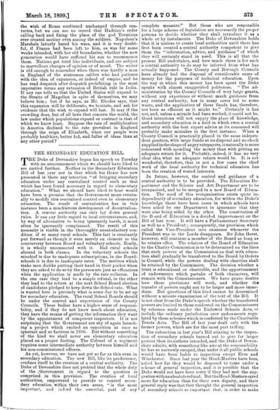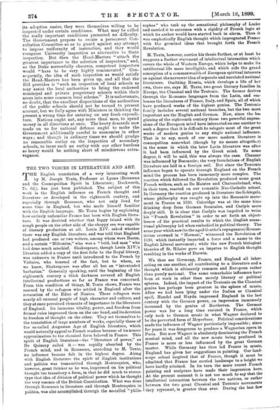THE SECONDARY EDUCATION BILL. T HE Duke of Devonshire began his
speech on Tuesday with an announcement which we should have liked to see carried further. Neither in the Secondary Education Bill of last year nor in that which his Grace has now presented is there any intention "of bringing secondary education under any centralised control such as that which has been found necessary in regard to elementary education." What we should have liked to hear would have been a promise that the Government mean eventu- ally to modify this centralised control even in elementary education. The result of centralisation has in this instance been a mischievous development of decentralisa- tion. A central authority can only lay down general rules. It MD pay little regard to local circumstances, and, by way of alternative to being ignorantly harsh, it must often be ignorantly complaisant. The result of this necessity is visible in the thoroughly unsatisfactory con- dition of so many rural schools. This fact is constantly put forward as though it were merely an element in the controversy between Board and voluntary schools. Really, it is wholly unconnected with it. Bad rural schools abound in both classes. In the volmitary schools the mischief is due to inadequate subscriptions, in the Board.. schools it is due to inadequate rates. The motives which make men dislike putting their hand in their pocket when they are asked to do so by the parson are just as efficacious when the application is made by the rate collector. In the one case they lead to a simple refusal, in the other they lead to the return at the next School Board election of candidates pledged to keep down the School-rate. What is wanted here is precisely what is some day to be set up for secondary education. The rural School Boards should be under the control and supervision of the County Councils. These bodies have a higher sense of responsi- bility, and if they do not know much about education, they have the means of getting the information they want by the appointment of competent inspectors. It is not surprising that the Government are shy of again launch- ing a. project which excited an opposition at once so ignorant and so factious in 1896. But without something of the kind we shall never see elementary education placed on a proper footing. The Colonel of a regiment requires some intermediate authority between himself and his non-commissioned officers.
As yet, however, we have not got so far as this even in secondary education. The new Bill, like its predecessor, confines itself to the creation of a central authority. The Duke of Devonshire does not pretend that the whole duty of the :Government in regard to the question is comprised in this provision. The creation of local authorities, empowered to provide or control secon- dary education within their own areas, "is the most important, and indeed the essential, part of any complete measure." But those who are responsible for a large scheme of legislation are necessarily the proper persons to decide whether they shall introduce it as a whole or by instalments. The Duke of Devonshire holds that it is useless to create local authorities until there has first been created a central authority competent to give them the "information, advice, and guidance" of which they will certainly stand in need. This is all that the present Bill undertakes, and how much there is for such a central authority to do may be inferred from what has actually happened. The County and Borough Councils have already had the disposal of considerable sums of money for the purposes of technical education. Upon the way in which this money has been spent the Duke speaks with almost exaggerated politeness. "The ad- ministration by the County Councils of very large grants, without any experience or without much guidance from any central authority, has in many cases led to some waste, and the application of these funds has, therefore, not been as efficient as it might be." Certainly it has not, and, unless a miracle had been worked, it could not be. Good intentions will not supply the place of knowledge, and secondary education is a field in which even a central authority with the best expert advice at its command will probably make mistakes in the first instance. When a County Council is practically placed in the same indepen- dent position, with large funds at its disposal and no check supplied in the shape of angry ratepayers, itnaturally is more concerned with spending the money than with getting an adequate return for it. Probably, indeed, it has no very clear idea what an adequate return would be. It is not wonderful, therefore, that in not a few cases the chief work of the local authority for technical education has been the creation of vested interests.
In future, however, the control and guidance of a central authority is to be provided. The Education De- partment and the Science and Art Department are to be reorganised, and to be merged in a new Board of Educa- tion. The need of this reorganisation exists quite in- dependently of secondary education, for within the Duke's knowledge there have been cases in which schools have been aided by one Department in ignorance that they were also being aided by the other. The constitution of the Board of Education is a decided improvement on the Bill of last year. It will have a Parliamentary Secretary as well as a President ; consequently, the provision which called the Vice-President into existence whenever the President was in the Lords disappears. Sir John Gorst, however, will continue a member of the Board as long as he retains office. The relation of the Board of Education to the Charity Commission is to be determined on the lines that such powers of the Commission as deal with educa- tion shall gradually be transferred to the Board by Orders in Council, while the powers dealing with charities shall be retained by the Commission. The decision whether a trust is educational or charitable, and the apportionment of endowments which partake of both characters, will remain with the Commissioners. We have grave doubts how these provisions will work, and whether the transfer of powers ought not to be larger and more imme- diate. But questions of this kind cannot be determined without a minute examination of the text of the Bill. It is not clear from the Duke's speech whether the transferred powers are limited to those conferred on the Commissioners by schemes made under the Endowed Schools Acts, or include the ordinary jurisdiction over endowments regu- lated by these schemes which is conferred by the Charitable Trusts Acts. The Bill of last year dealt only with the former powers, which are for the most part trifling.
The subsection in last year's Bill relating to the inspec- tion of secondary schools turned out to give far larger powers than its authors intended, and the Duke of Devon- shire admits, with something like awe at the responsibility he has so narrowly escaped, that under it all public schools would have been liable to inspection except Eton and Winchester. Since last year the Head-Masters have beer. asked how far they would be disposed to tome under a scheme of general inspection, and it is possible that the Duke would not have been sorry if they had met the sug- gestion with an absolute refusal. But the Head-Masters cared more for education than for their own dignity, and their general reply was that they thought the general inspection of secondary schools so important that, in order to make its adoption easier, they were themselves willing to be inspected under certain conditions. What may be called the really important conditions presented no difficulty. The Government propose to create a permanent Con- sultation Committee so as to guard against any attempt to impose uniformity of instruction, and they would recognise University inspection as alternative to State inspection. But then the Head-Masters "attach the greatest importance to the selection of inspectors," and, as the Duke sorrowfully observes, competent inspectors would "have to be very highly remunerated." Con- sequently, the idea of such inspection as would satisfy the Head-Masters has been given up, and all that the Bill provides is "such an inspection of local schools as may assist the local authorities to bring the endowed municipal and private proprietary schools within their areas into some common local scheme." It is unfortunate, no doubt, that the excellent dispositions of the authorities of the public schools should not be turned to present account, but we fully agree with Ministers in thinking the present a wrong time for entering on any fresh expendi- ture. Nations ought not, any more than men, to spend money in all directions at once. The heavy demands now made on us for national defence ought to make the Government additionally careful to economise in other ways ; and though in ordinary times we should grudge no reasonable outlay on the inspection of secondary schools, to incur such an outlay with our other burdens so heavy would be nothing short of mischievous extra- vagance.







































 Previous page
Previous page